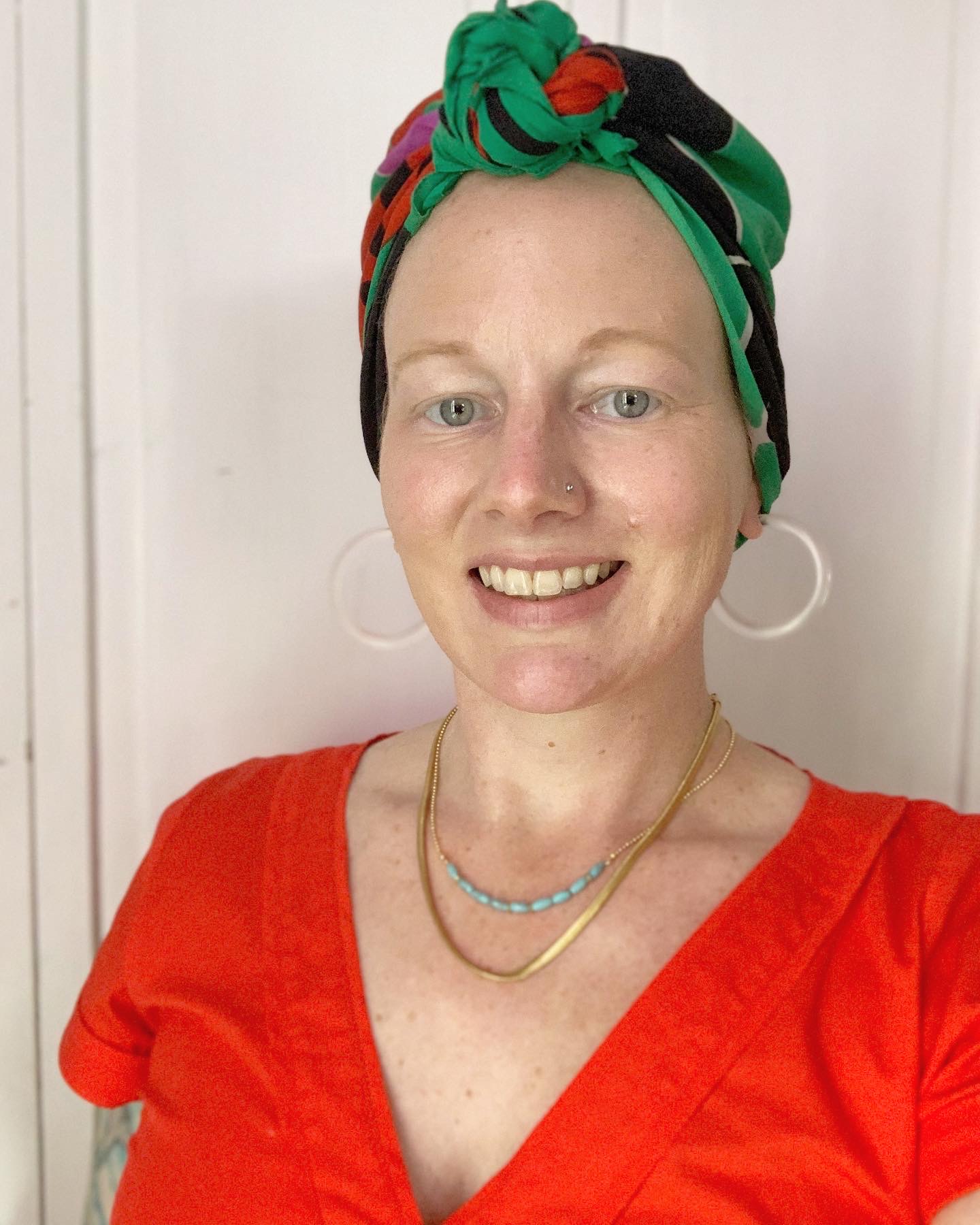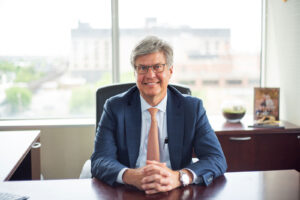There’s no convenient time to find out you have cancer, but getting the news while you’re alone in a foreign country is less than ideal.
In June 2018, I was diagnosed with stage IV colorectal cancer at 38 years old. Prior to my cancer diagnosis, I had recently dropped five dress sizes and was in the best shape of my life. I was running 5K races and strength training—my biggest accomplishment was hauling a combined 42 pounds of dog food, cat food and litter from the car to my front door in one trip. I had also just finished my first year in an MFA program at The University of New Orleans for creative writing and was in Cork, Ireland, working as a graduate assistant for my university’s study abroad program.
It was a Saturday and I was walking around the city by myself when I had a seizure. I had spent a month in Cork studying as an undergrad, so at least I was familiar with the city. Once I reoriented myself after the seizure, I walked around the corner to Burger King, where I knew my U.S. phone could pick up WiFi. I searched for the nearest hospital, jumped in a taxi and spent the next week in an Irish hospital—not exactly the cultural experience I expected. The doctors ordered an MRI, which revealed that I either had a brain infection or a tumor. When they asked me about my family history, I told them my dad died of colorectal cancer in 2001. This prompted them to schedule a colonoscopy, which is how the doctors found a tumor in my rectum. When I got back home to New Orleans, doctors confirmed that I had a brain tumor that originated in my rectum.
I spent two weeks total in Ireland. My husband flew out to get me (thanks, study abroad insurance) and we waited about five days to get a flight back home. After a week in the hospital, being back in the real world felt strange. I was on Prednisone to keep my brain from swelling, which prevented me from having another seizure. The steroids gave me more energy than usual and I lost weight. I was smaller than I had been in high school.
I had a flurry of appointments the day after our flight back home to New Orleans. I met with my oncologist, colorectal surgeon and neurosurgeon. I had a PET scan and two more MRIs before having brain surgery to remove the tumor on July 5 followed by radiation. I started 12 rounds of chemo in August a week before the fall semester of my graduate school program started. Five rounds of radiation were followed by a surgery to remove my rectum (where the tumor was located) and place an ileostomy bag.
During all of this, I was still attending school full-time and working part-time. Phew. I’m exhausted just typing that out. To say it was a lot would be an understatement, but I had no choice. I was on student health insurance, and my graduate assistant job was paying my tuition and providing me with a small stipend. Dropping out meant that I would lose my insurance and I needed to stay enrolled in classes full-time in order to keep my graduate assistant position.
Looking back, I don’t know how I managed to juggle everything but in the moment, there was no time for reflection. I slogged to class, my professor being patient when I would nod off as the chemo pump attached to me delivered toxins through my port. Classmates helped put books into my backpack when my hands were too cramped to do it myself, a side effect of the chemo. I got treatments every other week, so during my chemo off-weeks, I would get as much work done as possible to not fall behind. I turned assignments in early if I thought I might miss class. I tried to overcompensate in case I needed a deadline extension or if I missed too many classes. (I didn’t.)

Sitting in class, listening to my classmates complain about trivial matters like a bad hair day, made me realize how much I sweated the small stuff before my cancer diagnosis. I wish I didn’t have cancer, but I’m grateful for the accelerated life lessons I’ve received as a result, like not taking anything for granted.
After the spring semester, I had my ileostomy reversal surgery, which concluded my cancer treatment. Another PET scan in June revealed new lung nodules. At the time, my oncologist said they were too small to worry about just yet, so I hoped they were nothing.
I went back to Ireland that summer and had the fun experiences I so desperately needed. I sipped coffee at numerous cute cafés, devoured fish and chips and took in various independent films at the Triskel, Cork’s art centre and movie theater. Then, when the month-long program was done, my husband flew to Ireland and we toured the country, having celebratory pints in lively Irish pubs and absorbing much of the rich Irish history in museums. We stared in awe at the impossibly verdant landscapes through bus windows or ferry rides and went on long hikes. When we got back home, I was eager to start my final year of grad school. With cancer treatments behind me, all I had left to graduate was my comprehensive exams, two classes and my thesis.
But I was so, so wrong. Cancer was closer than I realized.
My lung nodules doubled in size and a biopsy confirmed the cancer was back. This felt like a setback; I made so much progress and I truly thought that treatment was behind me. It was as if I had just finished building a house from scratch, then someone took a wrecking ball to it and told me to start all over. I lost all of my hair—a mess of soft, springy curls— just as it had grown long enough to look somewhat cute from the last round of chemo. On campus, I was the cancer girl again.
This time, I had 14 rounds of chemo. I thought I would have just a few rounds and then I’d be done. But instead of an easier experience, my oncologist insisted on an aggressive treatment plan. The side effects from this cocktail of toxins wasn’t nearly as bad as the Oxaliplatin and Folfiri I was on last time. Still, I felt like I was at war with my body.
This time around was still difficult, but at least I only had to take one class each semester while working on my thesis. Chemo was easier too; the side effects from Irinotecan and Folfox weren’t as harsh. Not only did I manage to graduate on time, I was accepted into another MFA program for the fall, this time in photography, a hobby which piqued my interest six years ago. I was thrilled to deepen my knowledge and practice of taking photos, but I’m not going to lie—staying on student health insurance was a big motivating factor for jumping into grad school yet again. It’s ridiculous that I had to consider going back to school again just to be able to afford my cancer treatments and scans.
I’m about to start my last course of treatment—radiation, to these two pea-sized tumors nestled in my lungs. I hope this is the last of my treatments, at least for a long time. Having a stage IV diagnosis means I’ll never feel like cancer is truly over, even if I achieve NED status again. I’m always worried that the cancer will return, or that I will be told that there’s nothing more that my doctors can do for me. However, I’m not going to let that stop me from continuing to grow and change and set long term goals for myself, such as landing a book deal and finishing my fourth college degree. My future is as bright as it ever was.







